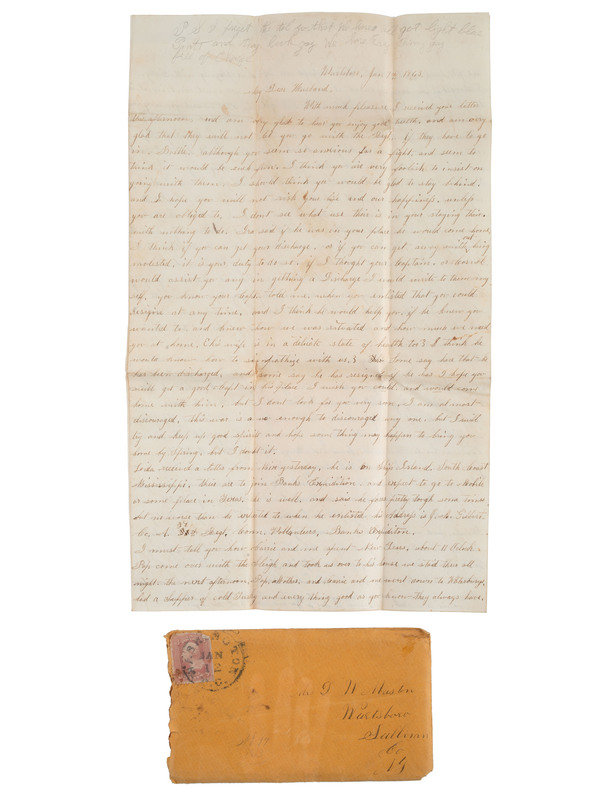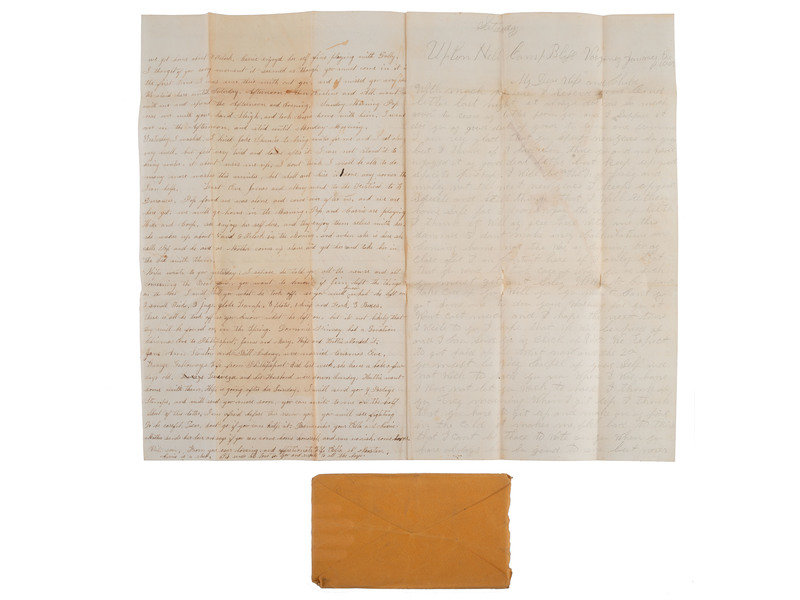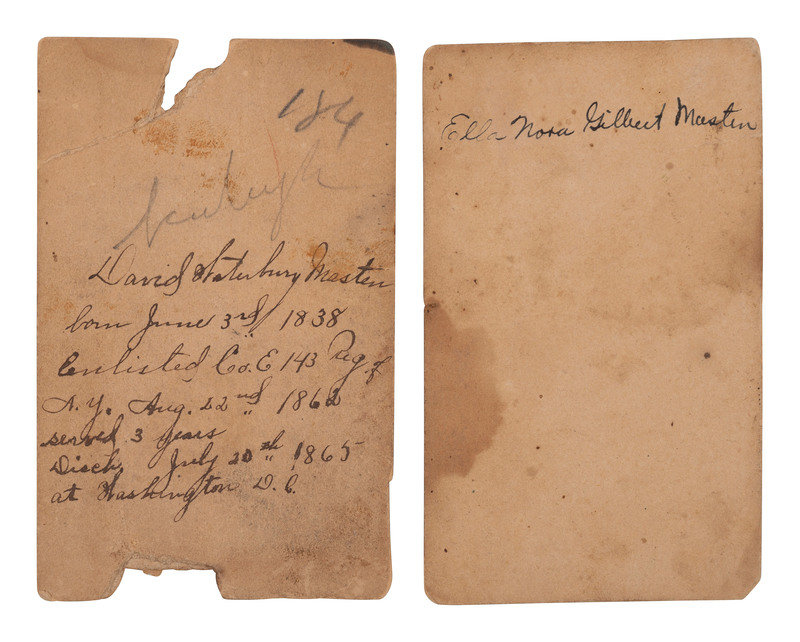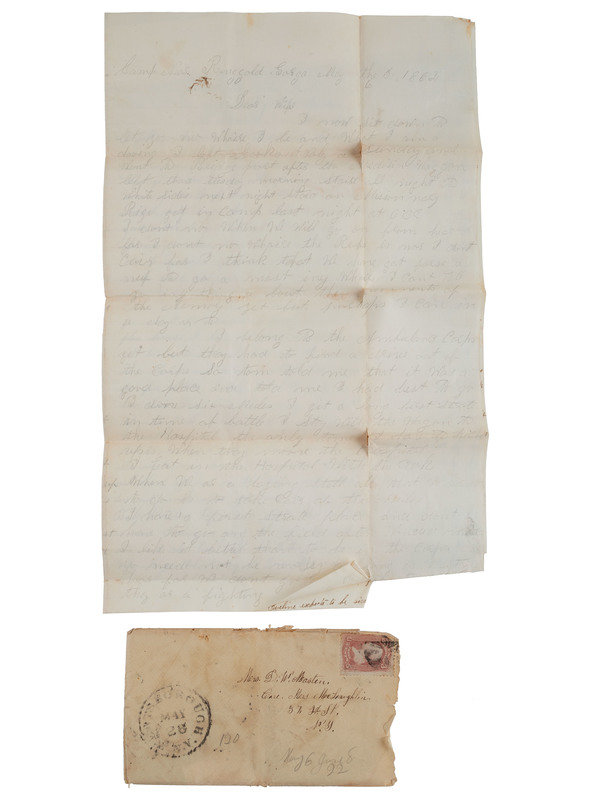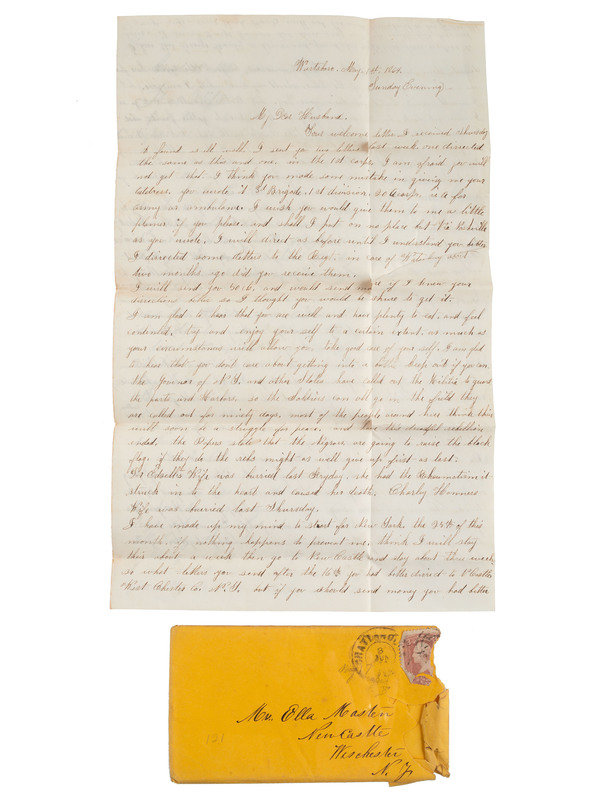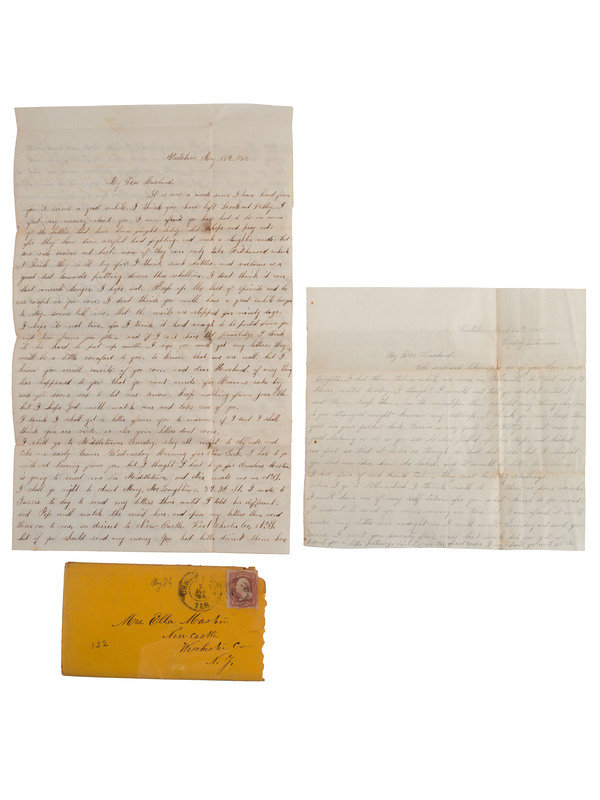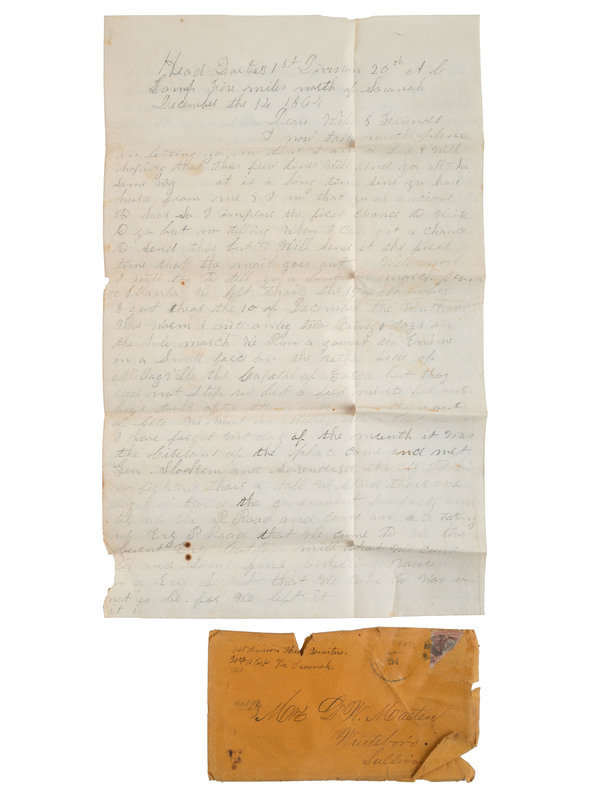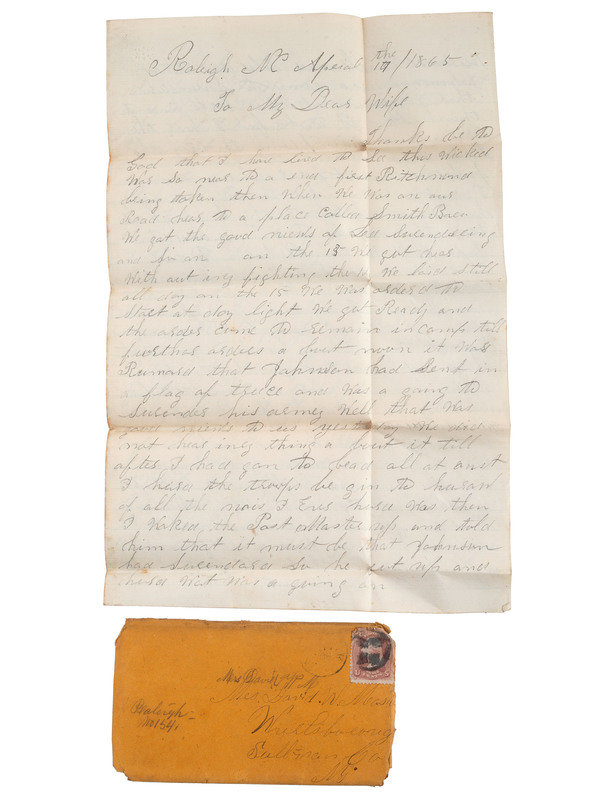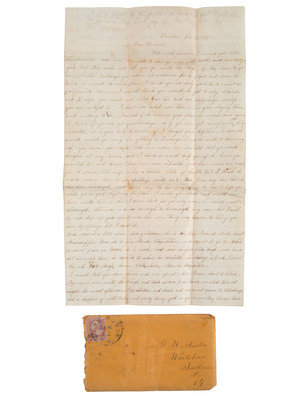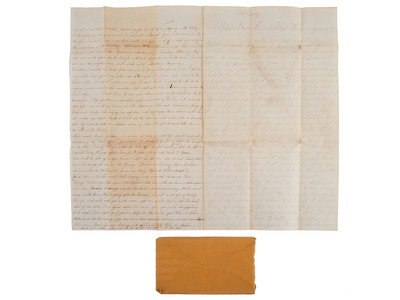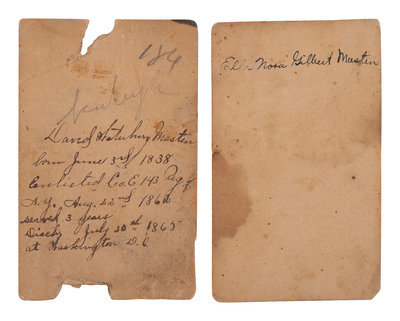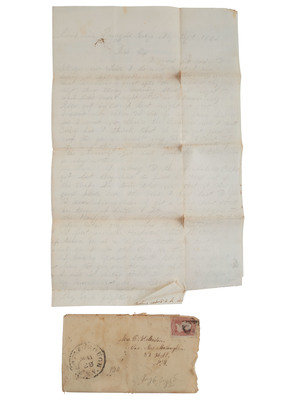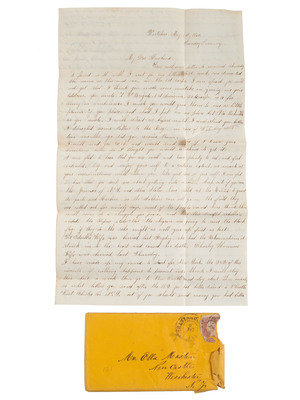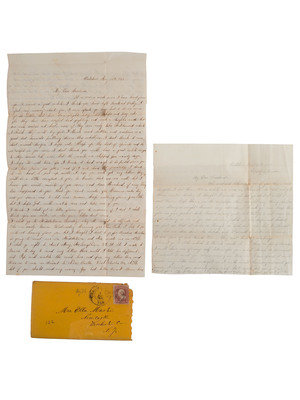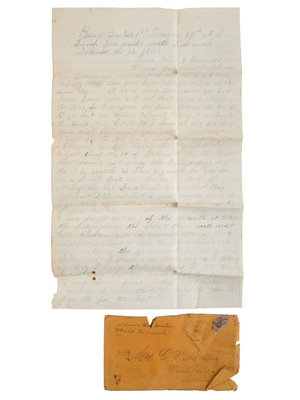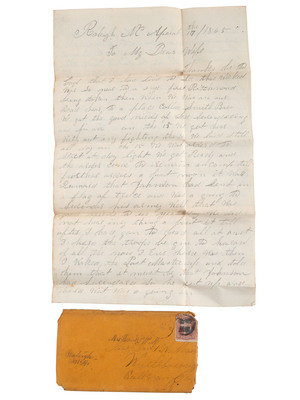Lot 136
Archive consisting of Civil War-date correspondence between David Waterbury Masten (1838-1911) and his wife Ella Nora Gilbert Masten (1839-1909). Most letters with original covers which are numbered from 1 to 168 (missing covers #94 and #101). Two distinct letters are sometimes authored on a single bi-folium lettersheet, as Ella often wrote a 2pp letter leaving the 3rd and 4th pages blank for her husband's replies which were then posted back to her. Masten also utilizes his correspondence as an opportunity to return his wife's standalone letters, resulting in multiple letters being housed within a single cover. Actual letter count housed within covers is approximately 288 letters, most 2-4pp, accomplished in a mix of ink and pencil. Another 25 related but unnumbered letters accompany the archive as do images of Masten and his wife. Condition of letters generally good, with expected toning and folds, some pencil faded but legible. Various places, October 1862-July 1865.
HDS indicates that 24-year old David Waterbury Masten enlisted as a musician on 8/22/1862 at Wurstboro, New York, mustering into Co. E, New York 143rd Infantry ("Sullivan County Regiment") on 10/8/1862. Masten was later "reduced to ranks," likely due to illness or his being detached to the Ambulance Corps, and served as a private for the remainder of the war. He was mustered out on 7/20/1865 at Washington, D.C. During its term of service the 143rd regiment saw extensive action, participating in the Chattanooga-Ringgold Campaign, the Atlanta Campaign, Sherman's March to the Sea, and the Carolinas Campaign.
The first letter in the archive dates to 16 October 1862. Masten describes his arrival in the nation's capital, where he and his regiment spent the first part of their enlistment at Upton's Hill, Virginia, on duty in the defenses of Washington, D.C. Letter "No. 17" marks the first instance in which the couple utilizes their unique letter writing strategy, with Ella writing pages 1 and 2 from Wurstboro on 7 January 1863, and Masten replying on pages 3 and 4 from Upton's Hill just three days later. Masten has previously indicated that he is eager for an engagement, and his wife gently chastises him for seeming "so anxious for a fight." She indicates here that if she believed she could write to his captain or colonel to successfully facilitate a discharge, she would do so. (Ella does indeed write to his superior officer, Colonel David P. Dewitt, whose reply is included in the archive). Masten remains in the relative safety of the DC vicinity throughout the early months of 1863. New York Civil War muster roll abstracts indicate that Masten was absent with leave, to return April 22, 1863, which coincides with a gap in his communication between April 1 and April 21. Correspondence indicates he had returned home during this period, likely due to the frail health of both his wife and their newborn child following her delivery. After leave Masten rejoined his regiment in the Department of Virginia, participating in the defenses of Suffolk, and still serving as a musician/drummer.
Masten's time with his regiment is short-lived, as he takes ill with a fever in late May 1863. On 4 June 1863, Lt. Peter L. Waterbury of Co. E (DOW 7/24/1864, at Peach Tree Creek, GA) writes to Ella ("No. 47") on behalf of Masten, indicating that Masten is too ill to write. New York muster rolls indicate he was absent from his regiment sick in hospital beginning June 4, though by June 25 Masten writes to his wife that had rejoined his regiment at camp near Yorktown. When the regiment returns to Washington, D.C. on July 10th, Masten takes himself to the Armory Square Hospital to recover his strength. The following day he writes to inform Ella that he has been asked by the Ward Master there to work at the hospital. "I think that I am a faring purty good not going With the Regt thay have Seen Ruf times and I think they Will See mar hard times...." Masten remains at the hospital serving in Ward H, noting on 8/30/1863 that he can dress a wound as well as anyone. Though others were examined to be sent back to the regiment in late August, Masten remains behind again on account of the Ward Master who "told the Dr that I was a good hand and he coud not spair me."Letter "No. 88" finds Masten in "Stevinson, Alabama" and on the cusp of rejoining his regiment which at this time has been reassigned to the Army of the Cumberland and is 22 miles away at Lookout Mountain. Masten's first foray deep into the Confederacy effects him deeply. He writes to his wife: "I have seen a splendid cuntry till I got this side of Nashville and from thair hear it looks as if God had cursed the hull [whole?] and left the inhabitents to look out for thair selves they ar a sufering for the want of something to eat and they are coming in all the time for to git something to eat. I tell yu it is tuf to see the women and children how they look they have no clothes nor nothing to eat the folks in the north don't no nothing about a bout hard times...." Masten notes here that Rebels are flooding into the camp as well and planning to join the Union with such numbers that soon they will "have a Rig [Regt] full of diserters...." Having not yet reached his regiment before the Battle of Missionary Ridge, Masten relays the news he hears of his regiment's assault at the battle, and of the wounding of their colonel (Lt. Col. Joseph B. Taft, KIA). He remarks on the hard times that his regiment has endured, "thay have sufard like dogs." Faint writing on a brief undated letter "No. 93" instructs Ella to resume writing on big sheets so that he can write back, because he "can't git iny paper here nor noting els." As 1863 closes, Masten has reached his regiment and is on duty in Lookout Valley.
New York muster rolls indicate that Masten was placed on detached service in the Ambulance Corps on January 16, 1864, and his letter of the same date relays this to his wife. The U.S. Ambulance Corps oversaw an organized system of battlefield evacuations, and as the Atlanta Campaign gained momentum Masten soon found himself surrounded by the carnage of war. On April 28 Masten indicates he has the opportunity to drive a medicine wagon for the brigade. In his next letter from "Camp Near Ringgold," he tells his wife that he has accepted the role and describes it: "I drive six mules...in time of battle I stay with the wagon to the Hospital the only time I have to Pick [?] up is When they move the Hospital...." Writing on May 17 from the Hospital, "Camp 15 Miles from Dalton State of Gorga," Masten describes the Battle of Resaca and its aftermath: "...the fight commenced on friday and lasted until Monday morning and then the Rebs left purty badly whiped the 143 Was in it they made two or three charges and Drove the Rebels evry time...We have a got a good many Rebs hear that is shot thay have as good care as our men dos ...the Hospital was two miles from the battle field it loked tuf to see so many have to have thair arms and legs taken of but such is the fortions of war...." Nearly two weeks later on May 29, Masten writes from "Camp on the Battlefield Near Dalas Gorga" noting that the battle (Battles about Dallas, New Hope Church, and Allatoona Hills) commenced on the 26th and was still raging. Still, Masten retains his sympathy for the civilians caught in the crossfire. On 8 June he writes from a hospital near Marietta: "I tell yu it is tuf for the poor women and children I have seen the soldiers take the last thing that thay had to eat and ... have seen them go in to a house and brake up all thair furniture evry little peace...and When We come a long to a nice pice of Wheat We are shure to camp in it and turn our Horse and Mules in it ...don't you think it rathar tuf."
Masten's letters continue to describe the advance of the regiment and the brigade. Operations continued near Marietta and against Kenesaw Mountain. An undated letter written from "the field that thay fout and gaind" describes operations leading to Marietta, describing how "the Rebs made a charge on our brest works With three line of battle but the Yankees piled them up so that thay had to lay on one a nother...." Later on June 22 [Kolb's Farm], he writes from "Hospital five miles from Mary Etta": "It has bin nothing but a continuous roring of canons and muskets all the time night and day," and when the hospital becomes too full of sick and wounded men the men are placed in the cars for transport to Chattanooga or other locations. He writes from a hospital 6 miles outside Atlanta and then from Atlanta, commenting on the destruction that the Yankee shells have wrought on the city, the hospital, and the Southern ladies "dressed in thair silks & satens...." As Union troops fortify their position in Atlanta Masten remains in the city until he departs on November 15, 1864, on Sherman's "March to the Sea." In a letter of December 14, Masten describes the arrival of the troops to Milledgeville, the state's capital: "We went in Milligeville a bout noon...it was the Citizens of the place come and met Gen Slockem [General Henry W. Slocum] and surrendered the city to him no fighting thair a tall...." From there Masten is witness to the Siege of Savannah and its occupation, the Campaign of the Carolinas, and the end of the war. His final letter to Ella is dated July 24, 1865.
AN UNUSUALLY LARGE AND COMPLETE ARCHIVE OF CORRESPONDENCE FEATURING BOTH SOLDIER LETTERS AND LETTERS FROM THE HOMEFRONT.
Masten's letters feature widespread utilization of phonetic spelling and poor grammar. Still, despite this, his missives provide a compelling record of the campaigns in which his regiment was engaged. In particular, his description of activity within the ambulance corps provides a unique window with which to view the conflict, shedding light on a lesser-known branch of military service.
[With:] 25 additional un-numbered letters, most related war-date correspondence to either David or Ella from friends and family members. One notable letter in this grouping is from Colonel David P. DeWitt, commander of the 143rd Regiment, who responds on 15 March 1863 to a letter from Ella indicating that he has no power to discharge her husband from duty, "except for permanent disability, which must be certified to by the surgeon of the regiment." DeWitt closes stating, "I would most willingly assist you were it in my power." Another letter of 29 May 1864 is written by Masten to his parents from a "Field Hospital near Dalas [sic]." Masten, working for the Ambulance Corps, writes following the previous day's Battle of Dallas, indicating that his life has been spared while hundreds have been shot. He must grease his wagon and is "on the march."
[Also with:] A group of three images: CDV of soldier in uniform identified on verso "David Waterbury Masten / born June 3rd 1838 / Enlisted Co. E 143 Reg. of / N.Y. Aug. 22nd 1862 / served 3 years / Disch. July 20th 1865 / at Washington, D.C."; CDV of a young woman identified on verso "Ella Nora Gilbert Masten" (both CDVs heavily toned and with significant wear including losses, creasing, dampstains, and spotting); and a real photo postcard by E.A. Koonz of Wurstboro, N.Y., showing David W. Masten's grave marker. -- Grand Army of the Republic veteran's badge featuring eagle hanger and American flag ribbon. -- Gilt wood frame, 7 1/4 x 7 1/4 in., housing a post-war image of Masten in civilian attire framed with red star XX Corps badge, approx. 1 in. x 1 in., above which is a small handwritten note "Worn by D.W. Masten / through Civil War / 20 Corps."
Prior to his enlistment, the 1860 US Federal Census identifies Masten's occupation as "Boatman" and his correspondence contains regular references to issues related to boats and work at home. After the war, it appears as if Masten returned to his previous occupation, with the 1870 US Federal Census identifying his occupation as "Boating on Canal." Later records identify him as a laborer and freight handler, and as a member of the G.A.R. and the I.O.O.F He died in Jersey City, New Jersey, in 1911.